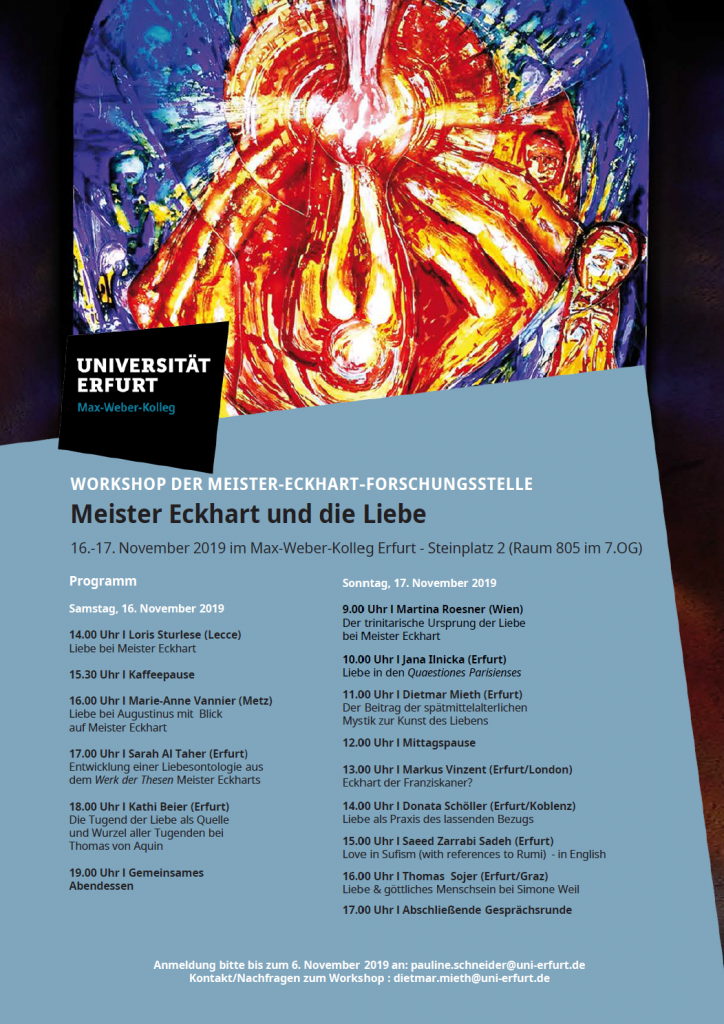The German Research Foundation (DFG) is supporting a research project by Dr. Jana Ilnicka at the Max-Weber-Kolleg of the University of Erfurt with funding totalling up to around 328,000 euros. It is entitled „The rediscovered manuscript MS Eisenach 1361 of the Wartburg Foundation and its partial parallels: Edition and Situations in Space and Time“ and is to be worked on over the next three years.
The Wartburg manuscript Ms Eisenach 1361-50 is a codex of 108 single-column leaves written on both sides (216 pages), 115×85 mm in size, produced in the XIV century and written in a West Middle High German dialect. It was originally in the Premonstratensian convent of Altenberg, before it first came into private ownership and then into the holdings of the Wartburg Foundation. The manuscript begins with thirteen psalms (2r-24v), all translated into Middle High German. This is followed by an anonymous sermon on the feast of the Assumption (25r-33r). From leaf 34r a series of 70 text pieces begins (34r-108v), some of them very short, the others longer. The last piece of text (n. 70) begins on fol. 108v and is not complete, as one leaf in the manuscript has been torn out. From fol. 34r on, the manuscript has partial parallels with the manuscript Berlin, SBB-PK, Ms. germ. fol. 986, and there are still some similar fragments in a Munich manuscript, Munich Cgm. 5235 (4th v. XIV Cologne?, M60).
Some of the 70 text pieces begin with the author’s name: Thomas Aquinas and Meister Eckhart are the two authorities mentioned by name as authors in this manuscript („Meister Thomas sagt“ or „Meister Eckhart sagt“), the others are anonymous („Ein Meister sagt“, „Einige Meister sagen“, „Es gibt eine Frage“). Some of the texts attributed to Meister Eckhart were edited by the first editor of Meister Eckhart’s German works, Franz Pfeiffer, as „sayings“ in his Eckhart edition of 1857. Some of these sayings were then identified by Heinrich Denifle (about 30 years later) and Josef Koch (about 100 years later) as edited translations of Eckhart’s Latin works translated into German, but the manuscript itself was considered lost since 1909 and Eckhart’s authorship of these pieces was widely disputed. The other texts, which were known at least from the partial parallel manuscript in Berlin, had not been researched since then. But a few years ago, Balázs J. Nemes and Markus Vinzent discovered this manuscript in the library of the Wartburg Foundation. As part of her research project, Jana Ilnicka will prepare a critical edition of this manuscript and make these texts accessible to researchers.
„The sample analysis of the manuscript so far has shown that these texts cannot be understood directly on their own, but must be introduced into the context of the philosophical-theological debate of the time, and that it is only out of this context that their precise contents emerge,“ Ilnicka reports. Such a contextualising analysis would then also make it possible to correct the information on authorship and contribute to research on the state of the debate in the 14th century.
„The language of the Wartburg manuscript, Middle High German, shows that the highly speculative theological themes were recorded in a vernacular, i.e., in a non-university setting. Therefore, the precise analysis of these texts will allow us to take a completely new look at lay education in the 14th century. Among other things, this concerns women’s education at the time, which, as the Wartburg manuscript suggests, cannot be reduced to „women’s mysticism“ alone.
For her work, Jana Ilnicka, who has already worked intensively on Meister Eckhart as part of her dissertation, will find competent discussion partners for these questions at the Max-Weber-Kolleg of the University of Erfurt, or more precisely, at the Meister Eckhart Research Centre located there. She will begin her work on 1 February 2021 – in the first step with the transcription of the manuscript. At the end of her research, she will present an annotated edition of the manuscript.


